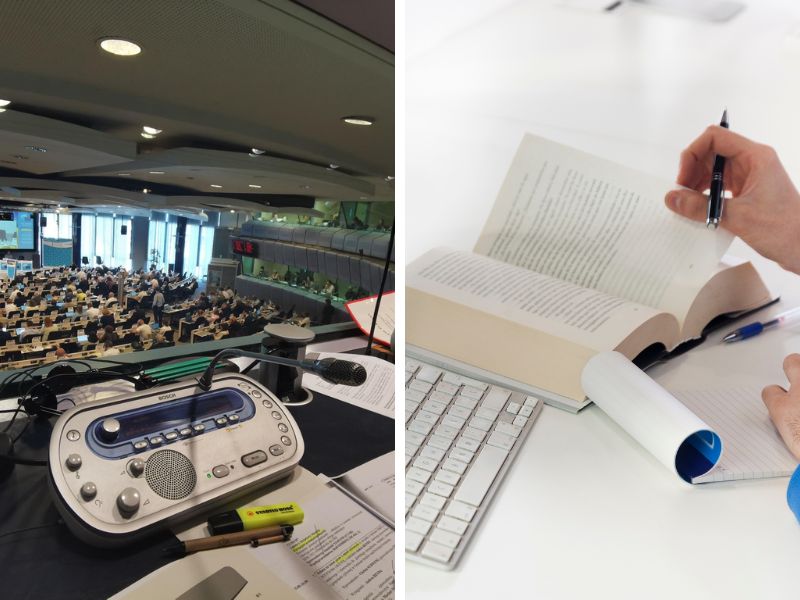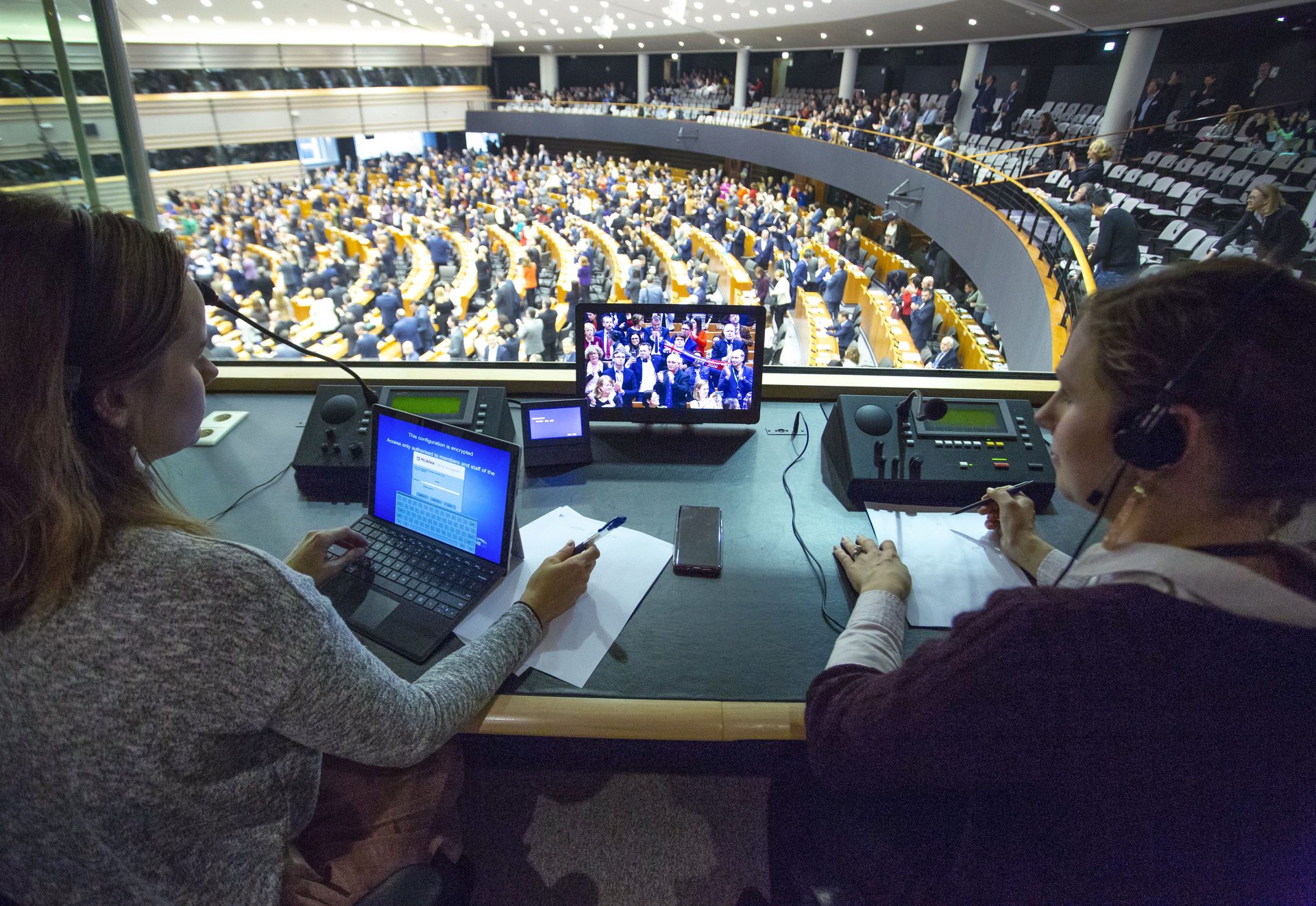Located at the heart of Europe and home to the EU with an extraordinary 24 working languages, the multilingual Belgian capital appears to be the perfect place to launch a career as a language professional. But how do you get in?
From editors and lawyer-linguists to terminologists and linguist agents, the European institutions provide an abundance of career opportunities for polyglots. Many opt for conference interpreting or translation – often mistaken to be the same but are in fact distinctly different jobs that require specialised skills and qualifications.
On the occasion of this year's multilingualism days, The Brussels Times takes a closer look at these two prominent, linguistic professions and gives some pointers on how to secure that dream job within the EU institutions.
Interpreting vs. translating
Despite their common passion for languages, interpreters and translators have some core differences. Essentially, translators convey the meaning of the written word from one language to another, whereas interpreters translate the spoken word, acting as a speaker's mouthpiece.
Both often work on a freelance basis, with several clients, but interpreters tend to travel more for work whilst translators have one office. While a specific translation qualification is strongly encouraged, a Master's degree (or equivalent training) is essential for budding conference interpreters.

Credit: EU Interpreters / Canva
Workflow also differs: translators have deadlines of varying lengths and may take weeks to perfect a project and polish multiple drafts. By contrast, an interpreter's work is all done in the moment – undeniably high-pressure but when it's done, it's done. One EU interpreter once described himself as a "linguistic plumber", as you "do the job, then go home."
As a result, many professionals say that the two require different personality traits: "curiosity, perseverance, meticulousness and an eye for detail" are all necessary for translation, says Croatian translator Ljerka Rados Gverijeri, who works in the European Commission's Directorate-General for Translation (DGT).
For conference interpreters, every day is an adrenaline rush – packed with on-the-spot decisions, anticipation and resilience. Just like translators, they must also be inquisitive about language, people and culture.
A day in the life
"Unsurprisingly, a typical day is mostly spent translating!" English translator John Evans from the DGT told The Brussels Times. "I usually have a number of documents on the go with different deadlines." He adds that sometimes more urgent requests may take priority, while revising colleagues' work is also part and parcel of the job.
"Translation can be quite solitary but working in DG Translation means there is a much more convivial atmosphere. I also enjoy the variety – both in terms of the types of documents we translate and the languages I work with."
"As long as you respect the deadlines, you can organise your time as you see fit," states Rados Gverijeri, admitting that "some documents are interesting, some less so, but if you love languages, you will always enjoy finding the right words to translate a tricky expression."
DG SCIC interpreter Joanne O'Donnell told The Brussels Times that no day is the same as an EU interpreter: "I may find myself in the mid-day Commission press briefing on Monday, in a meeting of technical experts going through environmental emissions standards on Tuesday, in a public hearing on urban planning in the European Committee of the Regions on Wednesday, then travelling on Thursday to a Council of Ministers meeting in Luxembourg."
Life-long learning
Language professionals in the EU enjoy and benefit from a life-long career of learning, particularly when it comes to specialist subject matter: "Translating in a new area can be quite a challenge but there are always colleagues (and resources) that can help you. As language professionals, we need to understand the things we are translating – there are abundant opportunities to learn about various topics," Rados Gverijeri explains.
As well as becoming more familiar with a range of subject matter, language professionals may also have the opportunity to learn new languages with on-the-job language training: "I started in DG Translation almost 20 years ago with French, Spanish and Portuguese and have since added Polish and Lithuanian, as we translate from all the official EU languages in the English Language Department," Evans says.
"Working as an interpreter in the institutions is a career that offers both variety and opportunities for life-long learning. I would say curiosity about people and about how the world works is a great starting point for anyone considering a career as an interpreter," O'Donnell concludes.
How to get into the 'bubble'
A variety of contracts are available for interpreters and translators: permanent staff (EU officials), temporary agents, contract agents (CAST), external contractors (freelancers) and trainees. Freelancers can be from anywhere around the world, but staff members must be EU citizens.
The EU's translation departments have regular openings throughout the year and the application process is similar to that of other Directorate-Generals, but includes extra translation tests. Harro Glastra from DGT's Communications Unit confirmed to The Brussels Times that applications will open for temporary agents for Portuguese and Croatian in October and will be published on the DGT's website.
Interpreters, meanwhile, must undergo strict accreditation tests to become both freelance and staff interpreters. They are tested on both their simultaneous (interpreting while the person is speaking) and consecutive skills (interpreting after the person has finished speaking, usually with notes).
Tests open several times a year for different languages; the next slots will be in November 2023 (applications close 29 September). Applicants usually only have three chances to pass, so preparation is key.

Credit: EU Interpreters / Facebook
Although the application process differs for interpreting and translating, both require good general knowledge. "Read widely in your own language," Evans advises, as being able to express yourself well in your native tongue is essential. "It is helpful if you are familiar with different digital tools, but you will receive in-house training," Rados Gverijeri adds.
For interpreters specifically, practice makes perfect. Once you have a Master's in conference interpreting, join the 'Interpreters in Brussels Practice Group', connect with other like-minded young professionals and make use of practice speeches from the Commission's Speech Repository. Constructive feedback from peers is invaluable.
Finally, contract lengths can vary but Rados Gverijeri stresses that applicants should not be dissuaded by fixed-term contracts, as when they expire "you will have gained important experience and opportunities in other institutions are likely to appear."
More information and practice tests can be found on the EPSO careers website.

